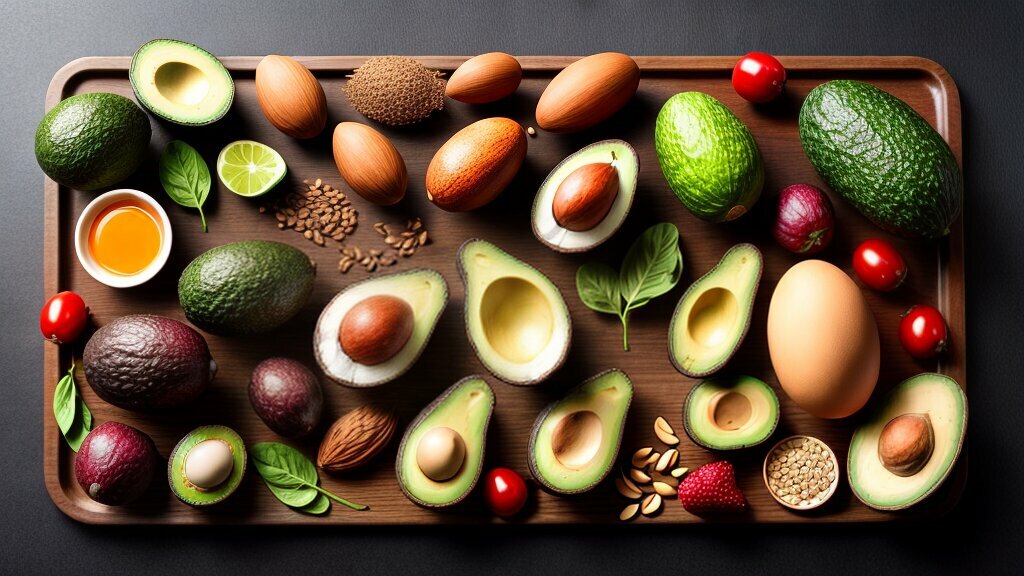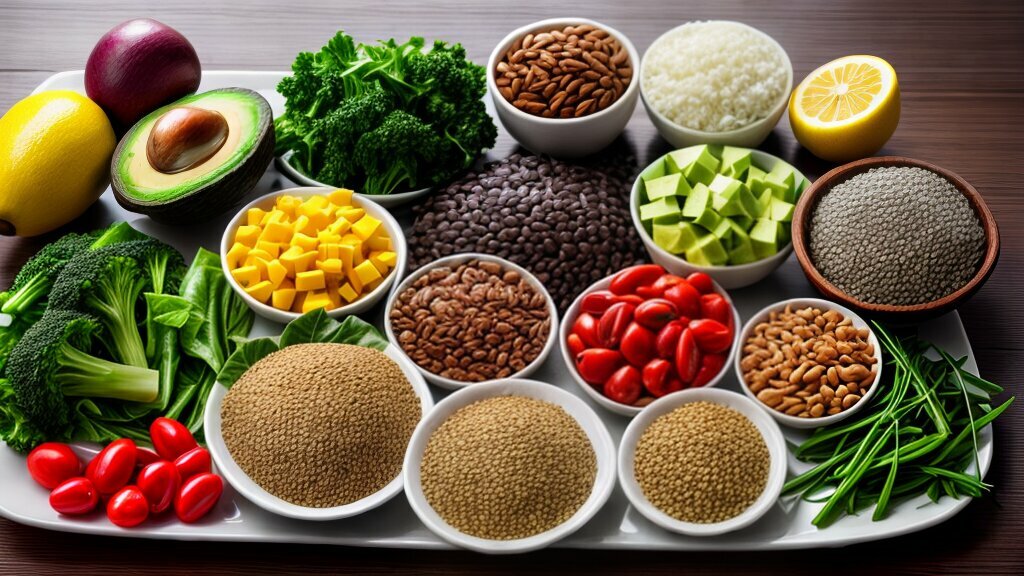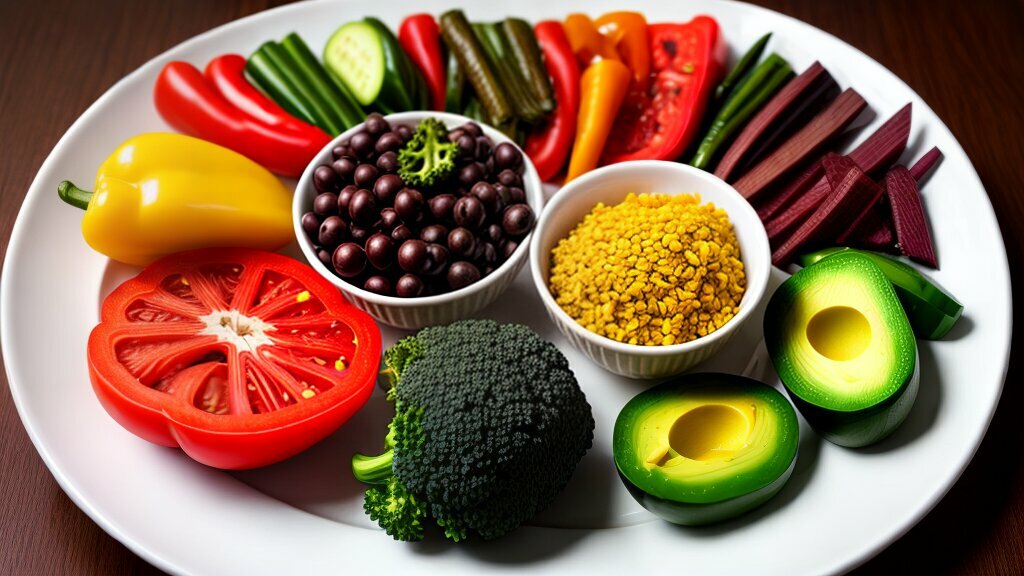Welcome to the ultimate guide for mastering your keto diet nutrition in Australia. The keto diet has become increasingly popular in recent years due to its potential for weight loss and improved metabolic health. However, to achieve the desired results, proper nutrition is crucial.
The ketogenic, low-carb diet is centered around high-fat, moderate protein, and low-carb foods. By restricting carbohydrate intake, your body enters a state of ketosis, where it burns fat for energy instead of glucose. But successful keto diet nutrition requires more than just low-carb eating. It’s essential to understand the specific nutrients and vitamins your body needs to thrive on this eating plan.
Key Takeaways:
- The keto diet is a popular, low-carb eating plan that promotes weight loss and improved metabolic health.
- Proper nutrition is crucial for success on the keto diet.
- Restricting carbohydrates and consuming high-quality fats, proteins, and low-carb vegetables is the foundation of the ketogenic diet.
- Achieving optimal nutrient and vitamin balance is critical on the keto diet to prevent deficiencies.
- Effective meal planning, overcoming challenges, and tracking progress are key to achieving success on the keto diet.
Understanding the Keto Diet
If you’re interested in the keto diet and its potential benefits, it’s essential to understand how this eating plan works. The keto diet is a high-fat, moderate protein, and low-carb eating plan designed to put your body into a state of ketosis.
Ketosis is a metabolic state in which your body burns fat for fuel instead of carbohydrates. When you limit your carb intake, your body switches from using glucose as its primary source of energy to using ketones, which are produced during the breakdown of fats in the liver. This process can lead to significant weight loss, improved energy levels, and better metabolic health.
The keto diet is different from other low-carb diets, such as Atkins, because it emphasizes fat intake as the primary source of calories. The standard keto macronutrient ratio is 70% fat, 25% protein, and 5% carbs. This means that you’ll need to consume plenty of healthy fats, such as avocados, olive oil, and nuts, while limiting your intake of carbohydrates, including sugar, bread, pasta, and grains.
Benefits of the Keto Diet
Research has shown that the keto diet may provide numerous health benefits beyond weight loss. Some potential benefits of the keto diet include:
- Reduced inflammation
- Improved insulin sensitivity
- Better blood sugar control
- Reduced risk of heart disease
- Improved mental clarity and cognitive function
Additionally, the keto diet may be helpful in managing certain health conditions, such as epilepsy, type 2 diabetes, and certain types of cancer. However, it’s essential to consult with a healthcare professional before making any significant changes to your eating plan.
Potential Risks of the Keto Diet
While the keto diet can be an effective way to lose weight and improve health, it’s not without potential risks. Some potential risks of the keto diet include:
- Keto flu: Some people experience flu-like symptoms when starting the diet, which may include headaches, fatigue, and nausea.
- Nutrient deficiencies: Because the keto diet is restrictive, it can be challenging to get all the nutrients your body needs.
- Increased risk of kidney stones: A high-protein diet can increase your risk of developing kidney stones.
- Bad breath: When your body is in ketosis, it may produce an unpleasant odor in your breath.
Overall, the keto diet can be a safe and effective way to improve your health when done correctly. It’s essential to work with a healthcare professional to ensure that you’re meeting your nutritional needs and staying healthy while following the keto diet.

Key Nutrients on the Keto Diet
While following the keto diet, it’s essential to maintain a balanced intake of key nutrients to support optimal health. Here are the nutrients you should focus on:
| Nutrient | Importance | Keto-Friendly Foods |
|---|---|---|
| Healthy Fats | Provide energy, support cellular function, and boost brain health | Avocado, nuts and seeds, olive oil, coconut oil, butter, ghee |
| High-Quality Proteins | Build and repair tissues, support immune function, and maintain muscle mass | Fatty fish, grass-fed beef, free-range poultry, eggs, full-fat cheese, tofu |
| Low-Carb Vegetables | Provide essential vitamins and minerals, fiber, and antioxidants | Leafy greens, broccoli, cauliflower, zucchini, cucumber, mushrooms, spinach |
Include these foods in your meals daily to ensure a well-rounded intake of key nutrients on the keto diet. You can also experiment with different recipes and ingredients to keep your meals interesting and enjoyable.

Essential Vitamins and Micronutrients
While the keto diet can provide numerous health benefits, it’s essential to ensure you’re getting adequate vitamins and micronutrients for optimal health. Due to the restrictive nature of the diet, some vitamins and minerals may be lacking if you’re not careful.
One essential nutrient to monitor is vitamin D, which is primarily obtained from sunlight exposure. Since the keto diet restricts many foods that are sources of vitamin D, it’s crucial to either increase your exposure to sunlight or supplement your diet with vitamin D.
| Vitamin | Food Sources |
|---|---|
| Vitamin B | Liver, eggs, leafy greens |
| Vitamin C | Bell peppers, strawberries, broccoli |
| Calcium | Kale, broccoli, dairy products |
| Magnesium | Pumpkin seeds, almonds, spinach |
| Potassium | Avocado, mushrooms, spinach |
Additionally, maintaining a healthy balance of micronutrients such as sodium, potassium, and magnesium is vital to prevent adverse side effects such as the ‘keto flu.’
Supplementation may be necessary in some cases to prevent deficiencies. Consult with a healthcare professional or registered dietitian to determine if you need to supplement and what specific vitamins or minerals you may be lacking on the keto diet.

Meal Planning for Keto Success
Effective meal planning is essential for your success on the keto diet. To maintain ketosis and promote optimal nutrition, it’s important to plan your meals carefully and ensure you’re consuming the right balance of macronutrients. Here are some tips for successful keto meal planning:
- Calculate your optimal macronutrient ratios. To achieve and maintain ketosis, it’s important to consume a high percentage of healthy fats, moderate protein, and low carbs. A typical ratio for a keto diet is 70% fat, 25% protein, and 5% carbs, but this can vary depending on individual needs. Use a keto calculator to determine your optimal macronutrient ratios.
- Plan your meals around healthy fats. Healthy fats are a crucial component of the keto diet and should be the foundation of your meals. Focus on foods like avocado, nuts and seeds, coconut oil, olive oil, and fatty fish.
- Incorporate high-quality protein sources. While protein should be consumed in moderation on the keto diet, it’s essential for maintaining muscle mass and supporting other bodily functions. Choose high-quality sources like grass-fed beef, free-range chicken, and wild-caught fish.
- Include plenty of keto-friendly vegetables. Low-carb vegetables are an important source of essential vitamins, antioxidants, and fiber on the keto diet. Choose leafy greens like spinach and kale, cruciferous vegetables like broccoli and cauliflower, and other low-carb options like zucchini, cucumber, and asparagus.
- Plan ahead for snacks and dining out. It can be challenging to find keto-friendly options when snacking or eating out, so make sure to plan ahead. Keep healthy snacks on hand, like cheese, nuts, and seeds, and research keto-friendly restaurants in advance.
By following these tips and planning your meals carefully, you’ll be well on your way to keto success. Remember to track your progress and adjust your nutrition as needed to achieve your goals.

Overcoming Challenges on the Keto Diet
Following the keto diet can be challenging, and there may be some roadblocks along the way. These challenges can include the keto flu, which is a collection of symptoms that can occur during the initial stages of the diet, such as headaches, fatigue, and nausea. However, these symptoms are usually temporary and can be managed effectively with the right approach.
One of the best ways to overcome challenges on the keto diet is by monitoring your nutrition closely. Make sure you are getting enough healthy fats, protein, and low-carb vegetables, and stay hydrated. Additionally, you may need to adjust your macronutrient ratios to suit your individual needs. For example, some people may need more carbs to support their activity levels or may need to increase their protein intake to support muscle growth and maintenance.
If you are experiencing challenges on the keto diet, it is also a good idea to seek professional advice. A qualified nutritionist or dietitian can help you identify any potential deficiencies or imbalances in your nutrition and provide guidance on how to make adjustments effectively. They can also provide additional strategies and support to help you stay on track and achieve success.
Managing the Keto Flu
If you are experiencing the keto flu, it is important to take steps to manage your symptoms effectively. One of the best ways to do this is by staying hydrated and replenishing your electrolytes. You can do this by drinking plenty of water and incorporating foods high in electrolytes, such as avocado, spinach, and nuts, into your diet.
In addition, it is important to get plenty of rest and to avoid strenuous exercise during this time. Your body is adjusting to the new diet and needs time to adapt. Be patient, remain positive, and remember that these symptoms are usually temporary.

“The keto flu is a collection of symptoms that can occur during the initial stages of the keto diet.”
As you progress on the keto diet, you may encounter other challenges, such as social pressures or a lack of motivation. To overcome these challenges, it can be helpful to stay focused on your goals, to seek support from friends and family, and to track your progress regularly. This can help you stay motivated and on track to achieving success on the keto diet.
Staying Motivated and Tracking Progress
Staying motivated on the keto diet can be challenging, but there are strategies you can use to maintain enthusiasm and adherence.
First, set realistic goals and celebrate your successes along the way. Whether it’s reaching a weight loss milestone or maintaining ketosis for a certain period of time, take the time to acknowledge your achievements and reward yourself appropriately.
Second, enlist the support of family and friends. Explain your dietary goals and how they can help you stay on track. Having a support network can make all the difference when times get tough.
Third, track your progress using various methods. Monitoring weight, body measurements, and energy levels can provide valuable feedback on the effectiveness of your nutrition plan. Consider using apps or tracking tools to make the process easier.
Finally, adjust your nutrition and exercise routine as needed to achieve your desired results. Consulting with a healthcare professional or registered dietitian can provide valuable insights and support on your journey.
Remember, mastering keto diet nutrition takes time and commitment, but with the right mindset and strategies, you can achieve your goals and feel your best on the keto diet.

Conclusion
By now, you should have a good understanding of how to master your keto diet nutrition in Australia. Remember that proper nutrition is key to achieving success on the ketogenic, low-carb diet. It’s important to understand the principles of the keto diet, including its benefits and potential health risks, and to focus on consuming healthy fats, high-quality proteins, and low-carb vegetables.
In addition to these key nutrients, it’s also important to maintain proper vitamin and micronutrient balance on the keto diet. Be aware of the vitamins and minerals that may be lacking in a ketogenic eating plan and consider supplementation if needed.
Meal planning is another crucial aspect of keto success. Ensure you’re consuming a balanced ratio of macronutrients and use our tips and guidance to plan your meals effectively and dine out while maintaining ketosis.
Remember that challenges may arise when following the keto diet, so it’s important to stay motivated and track your progress to adjust nutrition and exercise as needed. If you’re experiencing any adverse side effects, seek professional advice immediately.
Finally, we hope this guide has provided you with practical tips and guidance to achieve your goals and feel your best on the keto diet. Apply what you’ve learned and remember to prioritize proper keto diet nutrition to maintain optimal health and wellness.
FAQ
Q: What is the keto diet?
A: The keto diet is a low-carb, high-fat diet that aims to put the body into a state of ketosis, where it uses fat as its primary source of fuel instead of carbohydrates.
Q: What are the benefits of the keto diet?
A: The keto diet can help with weight loss, improved metabolic health, increased energy levels, and enhanced mental clarity and focus.
Q: What nutrients are important on the keto diet?
A: Healthy fats, high-quality proteins, and low-carb vegetables are crucial nutrients on the keto diet.
Q: Are there any risks associated with the keto diet?
A: Some potential risks of the keto diet include nutrient deficiencies, electrolyte imbalances, and the “keto flu” during the initial adaptation phase.
Q: How can I plan meals effectively on the keto diet?
A: Planning meals with balanced macronutrient ratios and using sample meal plans can help ensure optimal nutrition on the keto diet. Tips for dining out while maintaining ketosis are also available.
Q: How can I overcome challenges on the keto diet?
A: Common challenges on the keto diet include the keto flu and managing side effects. Strategies for overcoming these challenges include proper nutrition monitoring and seeking professional advice if needed.
Q: How can I stay motivated and track progress on the keto diet?
A: Staying motivated on the keto diet can be achieved by tracking progress through weight, body measurements, and energy levels. Adjusting nutrition and exercise as needed is also important for desired results.
